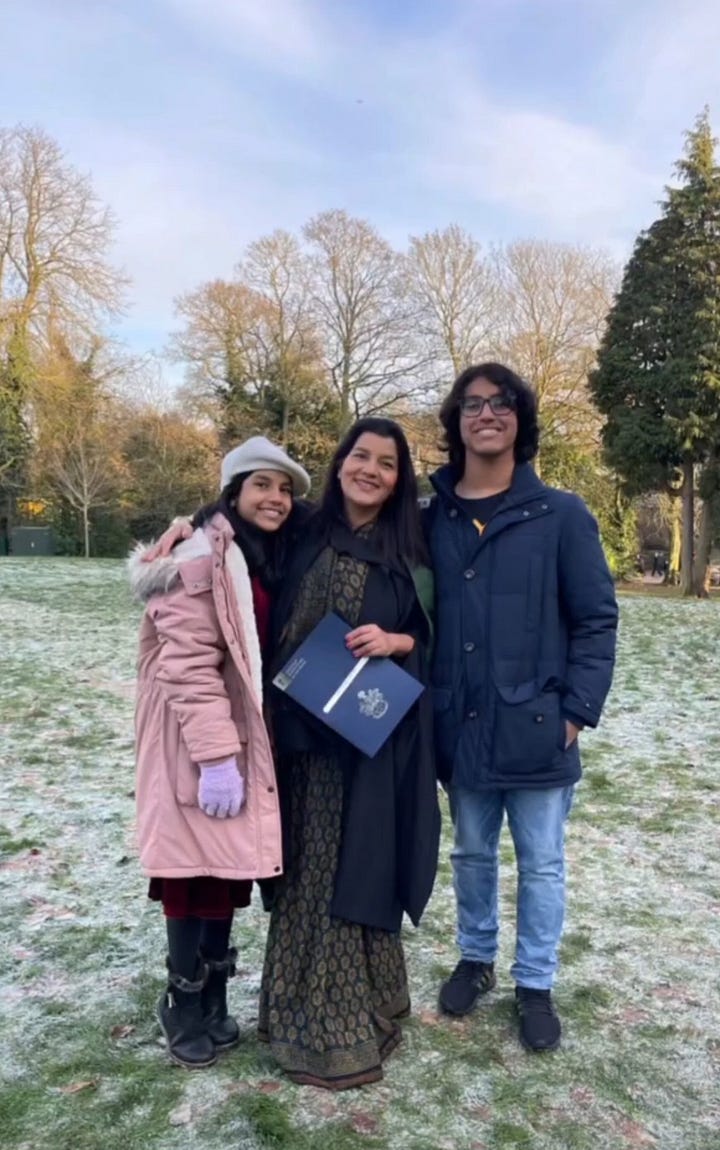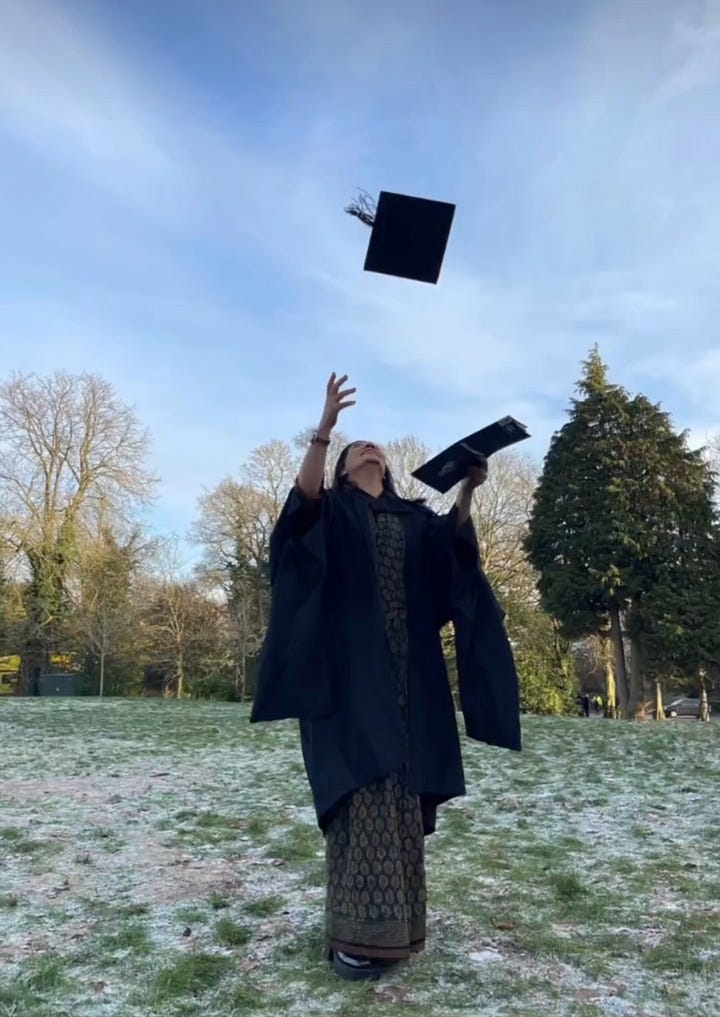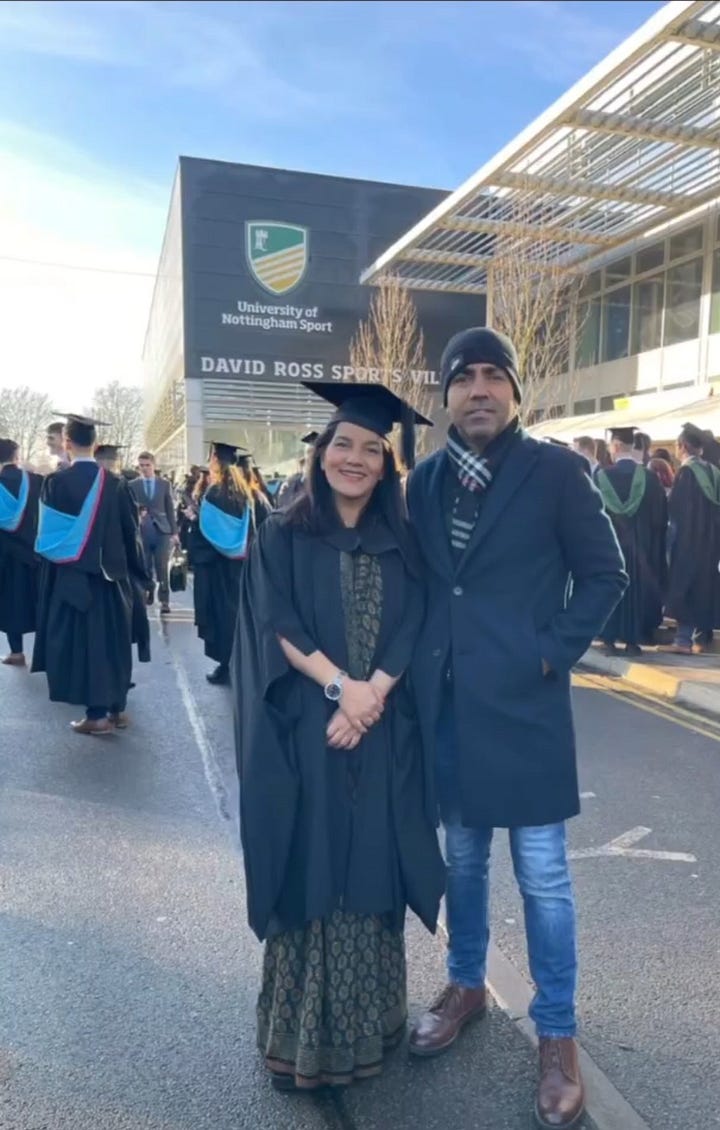The following post is part of a Seed Pod collaboration about time. Seed Pods is a SmallStack community project designed to help smaller publications lift each other up by publishing and cross-promoting around a common theme. We’re helping each other plant the seeds for growth!
My father didn’t want to die. He passed away in his late 70s from multiple organ failure, cared for by his wife, children, and grandchildren. Shaped by losing his mother so young he couldn’t remember her face, my father suffered from undiagnosed depression and anxiety. Growing up with five siblings, he faced a tough upbringing in Hazaribagh—a small town in Bihar, India—with life becoming harder once they lost their father too.
Employment in the UAE (United Arab Emirates) elevated him to the upper-middle-class circle, but his early struggles lingered, leaving him plagued by health issues. Slouched in his 40s, he suffered from insomnia and couldn’t leave the house without multiple trips to the toilet. A chronic worrier, my father offered a problem to every solution.
As his only daughter and eldest child, I shared a special bond with my father. He never differentiated between my opportunities and those of my brothers - a rarity in our culture at the time. While he returned to his retirement home in Mumbai, I continued living in the Gulf. Like my father, I am a people person; we spent hours on the phone, exchanging anecdotes from our daily lives.
The small-town man never adjusted to Mumbai’s bustle. Though a halo of gloom often followed him, there was one thing that always made my father smile—being around people. Meeting family and friends brought a childlike glow to his face. Despite his means, he never traveled beyond his hometown, shrinking his life to the bare minimum—a modesty typical of his generation of Indians. However, in the last few years before passing, he spoke of visiting Goa, Bangalore, and even the West. Because these were the places where our friends and relatives lived, I suspect his desire to travel was less about exploration and more about seeking connection.
People say he lived a good life, but I knew that, since retiring, he had hit the depths of loneliness and depression. Despite having impressive growth, my father constantly felt like he didn’t ‘do enough.’ Paralyzed by self-doubt, he confined himself to his room, glued to a TV and a tablet that connected him with his kids abroad. Over time, his lack of confidence manifested in a stoop so low it made him look 90 at 70.
It was heartbreaking to see life unfold around him while he remained a passive spectator. So, as he lay frail in the hospital bed in a royal blue gown, I held his cold, IV-bruised hand, making him revisit the stories of his youth: his first job, his marriage, his first car—a silver Honda Accord—and the pride he felt for his three children. Together, he and I imagined family trips to the places he longed to visit. It was my job to read out to him the get-well-soon phone messages from his well-wishers. When he had enough energy, he would ask me to check back on them and thank them for their concern as we meandered into more stories about loved ones. His faint smile, accompanied by tears trickling down his closed eyes, kept us both warm in the freezing ICU room.
I was convinced that when his time would come, he would willingly give in. Yet, I never knew a depressed soul in a degenerating body could resist death so fiercely. Bedridden in palliative care, he asked for a walker so he could walk ‘soon,’ using it twice before he couldn’t. Watching him cling to life with such determination made me appreciate the fragility of time and how seductive life appears when she’s about to leave.
Despite growing up with greater comfort, I inherited my father’s inertia—crippled with a lack of confidence, I stuck to soul-sucking jobs even when I could leave and used my spouse as a punching bag for my indecisiveness. Resist the stench of gloom all you want; it sticks to your body like smoke, seeping into your skin, where no amount of scrubbing can wash it away.
My body mirrored my inner turmoil; I was diagnosed with Hashimoto’s and was tested for Irritable Bowel Syndrome. The weight of feeling worthless reflected in my back - just like my father’s did - through an ugly protruding bulge ruining my posture. Perimenopausal symptoms only added to the pile of mess.
Unlike my father, I had access to therapy. It helped me unravel deep familial patterns—fears of failure, the feeling of lack, and the guilt of desiring more—that shaped both him and me. Therapy gave me tools to rewrite my narrative, breaking the cycle of procrastination and inaction.




Soon after his passing, I began writing personal essays, sharing my stories, and finding myself a community where vulnerability was met with understanding. Through these connections, I found healing and a renewed sense of purpose. Writing also made me friends with solitude; I stopped using people to escape life’s drudgery.
For a long time, I wondered if this need for connection - my father’s and mine - made us seem empty or needy. But through writing and therapy, I’ve come to realize there’s no shame in being a people person. Some of us genuinely thrive in the company of others. Plus, don’t we all crave a bit of validation? Isn’t posting on Substack regularly, celebrating new subscribers, and yearning for higher engagement clear evidence of our desire to be seen, to be acknowledged? Notice the rush of adrenaline when you hit ‘publish’ on an essay and the surge of dopamine as comments start pouring in? Why are we so afraid to admit that we need people in our lives? I LOVE people, and I LOVE being seen.
What I fear, though, is being seen in the wrong way—or in a way that could hurt my feelings. I want more readers, yet I fear backlash to my work. Isn’t that normal, though? The want for connection and the need to be seen is a natural human tendency, and there’s nothing shameful about it.
I remember an aunt—my father’s friend’s wife—calling me after his death to say, “I had multiple miscarriages before I had my only child. When we arrived in the UAE, we had no family here. Your father was like a brother to my husband and me. He often volunteered to babysit Amna so my husband and I could get a breather.”
If that doesn’t exemplify the beauty of connection and the strength of community, what does? We’ve got to be the village we seek.
One should only know the difference between authentically being there for others and overextending oneself for ulterior motives. That saying ‘no’ to those you love is okay. And if your loved ones have a problem with that, are they really your people? Should you be investing your time and energy in such relationships? Or are we holding on to toxic connections simply because we’re afraid of being alone?
The more clarity my mind acquired, the better my body felt. My breathing and posture improved, my gut healed.
Ignited by a hunger for life in my 40s, I quit my job, pursued a new degree, and planned leisure trips.
Seizing a fistful of the sand of time, I want to place it close to my heart and whisper, “Please bear with me; I’ve only just begun.”
In my own ways, I have built upon what my father taught me. As a mother of two, I hope to pass on this legacy to my children—teaching them the value of resilience, the beauty of connection, the power of our stories, and, above all, the belief that we are enough.
As the year draws to a close, I’d like to believe that if my time on Earth were to end now, I would leave fulfilled, ready to meet my father in Barzakh[1], bringing him the gift of stories I continued from where he left off.
And in this fleeting, finite moment of realization, I may have discovered my forever.
[1] In Islam, Barzakh is an Arabic word that refers to an intermediate realm where a soul resides after death before the Day of Judgement. Muslims believe that if one performs good deeds, they will be reunited with their loved ones in Barzakh.
Want to see more posts from this Seed Pod or join in on the fun? Head over to our roundup to learn more!




What a testament to the healing power of telling our stories and idea that it's never too late to change and grow!
I admire how you touched on so many themes - a lack of confidence, finding connection, of being open and honest, of reaching out and yet taking care of yourself. And the special bond you shared with your Dad, Sanobar. I'm sure he's rooting for you from above! ♥
Oh Sanobar, you are after my own heart. Hashimoto's, bad posture, IBS, getting a PG degree in 40's, the need for connections, it's all there. And the improvements as well.
Beautiful essay as usual. How I wish I could express myself like this.